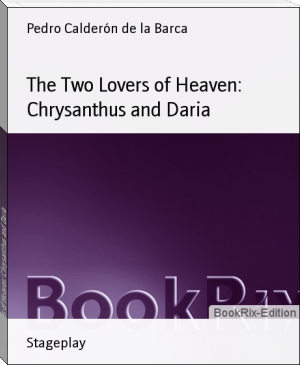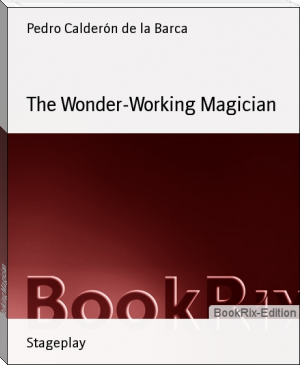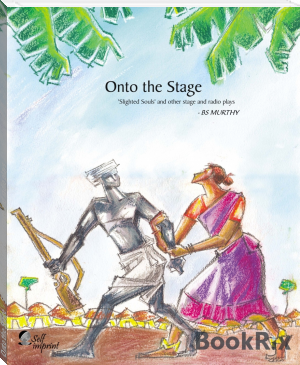Life Is a Dream by Pedro Calderón de la Barca (portable ebook reader TXT) 📖

- Author: Pedro Calderón de la Barca
Book online «Life Is a Dream by Pedro Calderón de la Barca (portable ebook reader TXT) 📖». Author Pedro Calderón de la Barca
Less surprised and sad than he?
CLARIN. I for one.
SECOND SERVANT [to the First]. You had best address him.
FIRST SERVANT [to SIGISMUND]. May they sing again?
SIGISMUND. No, no;
I don't care to hear them sing.
SECOND SERVANT. I conceived the song might bring
To your thought some ease.
SIGISMUND. Not so;
Voiced that but charm the ear
Cannot soothe my sorrow's pain;
'Tis the soldier's martial strain
That alone I love to hear.
CLOTALDO. May your Highness, mighty Prince,
Deign to let me kiss your hand,
I would first of all this land
My profound respect evince.
SIGISMUND [aside]. 'Tis my gaoler! how can he
Change his harshness and neglect
To this language of respect?
What can have occurred to me?
CLOTALDO. The new state in which I find you
Must create a vague surprise,
Doubts unnumbered must arise
To bewilder and to blind you;
I would make your prospect fair,
Through the maze a path would show,
Thus, my lord, 'tis right you know
That you are the prince and heir
Of this Polish realm: if late
You lay hidden and concealed
'Twas that we were forced to yield
To the stern decrees of fate,
Which strange ills, I know not how,
Threatened on this land to bring
Should the laurel of a king
Ever crown thy princely brow.
Still relying on the power
Of your will the stars to bind,
For a man of resolute mind
Can them bind how dark they lower;
To this palace from your cell
In your life-long turret keep
They have borne you while dull sleep
Held your spirit in its spell.
Soon to see you and embrace
Comes the King, your father, here -
He will make the rest all clear.
SIGISMUND. Why, thou traitor vile and base,
What need I to know the rest,
Since it is enough to know
Who I am my power to show,
And the pride that fills my breast?
Why this treason brought to light
Has thou to thy country done,
As to hide from the King's son,
'Gainst all reason and all right,
This his rank?
CLOTALDO. Oh, destiny!
SIGISMUND. Thou the traitor's part has played
'Gainst the law; the King betrayed,
And done cruel wrong to me;
Thus for each distinct offence
Have the law, the King, and I
Thee condemned this day to die
By my hands.
SECOND SERVANT. Prince . . . .
SIGISMUND No pretence
Shall undo the debt I owe you.
Catiff, hence! By Heaven! I say,
If you dare to stop my way
From the window I will throw you.
SECOND SERVANT. Fly, Clotaldo!
CLOTALDO. Woe to thee,
In thy pride so powerful seeming,
Without knowing thou art dreaming!
[Exit.
SECOND SERVANT. Think . . . .
SIGISMUND. Away! don't trouble me.
SECOND SERVANT. He could not the King deny.
SIGISMUND. Bade to do a wrongful thing
He should have refused the King;
And, besides, his prince was I.
SECOND SERVANT. 'Twas not his affair to try
If the act was wrong or right.
SIGISMUND. You're indifferent, black or white,
Since so pertly you reply.
CLARIN. What the Prince says is quite true,
What you do is wrong, I say.
SECOND SERVANT. Who gave you this licence, pray?
CLARIN. No one gave; I took it.
SIGISMUND. Who
Art thou, speak?
CLARIN. A meddling fellow,
Prating, prying, fond of scrapes,
General of all jackanapes,
And most merry when most mellow.
SIGISMUND. You alone in this new sphere
Have amused me.
CLARIN. That's quite true, sir,
For I am the great amuser
Of all Sigismunds who are here.
* * * * *
SCENE IV.
ASTOLFO, SIGISMUND, CLARIN, Servants, and Musicians.
ASTOLFO. Thousand tunes be blest the day,
Prince, that gives thee to our sight,
Sun of Poland, whose glad light
Makes this whole horizon gay,
As when from the rosy fountains
Of the dawn the stream-rays run,
Since thou issuest like the sun
From the bosom of the mountains!
And though late do not defer
With thy sovran light to shine;
Round thy brow the laurel twine -
Deathless crown.
SIGISMUND. God guard thee, sir.
ASTOLFO. In not knowing me I o'erlook,
But alone for this defect,
This response that lacks respect,
And due honour. Muscovy's Duke
Am I, and your cousin born,
Thus my equal I regard thee.
SIGISMUND. Did there, when I said "God guard thee,"
Lie concealed some latent scorn? -
Then if so, now having got
Thy big name, and seeing thee vexed,
When thou com'st to see me next
I will say God guard thee not.
SECOND SERVANT [to ASTOLFO]. Think, your Highness, if he errs
Thus, his mountain birth's at fault,
Every word is an assault.
[To SIGISMUND.]
Duke Astolfo, sir, prefers . . . .
SIGISMUND. Tut! his talk became a bore,
Nay his act was worse than that,
He presumed to wear his hat.
SECOND SERVANT. As grandee.
SIGISMUND. But I am more.
SECOND SERVANT. Nevertheless respect should be
Much more marked betwixt ye two
Than 'twixt others.
SIGISMUND. And pray who
Asked your meddling thus with me?
* * * * *
SCENE V.
ESTRELLA. - THE SAME.
ESTRELLA. Welcome may your Highness be,
Welcomed oft to this thy throne,
Which long longing for its own
Finds at length its joy in thee;
Where, in spite of bygone fears,
May your reign be great and bright,
And your life in its long flight
Count by ages, not by years.
SIGISMUND (to CLARIN). Tell me, thou, say, who can be
This supreme of loveliness -
Goddess in a woman's dress -
At whose feet divine we see
Heaven its choicest gifts doth lay?-
This sweet maid? Her name declare.
CLARIN. 'Tis your star-named* cousin fair.
[footnote] *'Estrella', which means star in Spanish.
SIGISMUND. Nay, the sun, 'twere best to say.-
[To ESTRELLA.]
Though thy sweet felicitation
Adds new splendour to my throne,
'Tis for seeing thee alone
That I merit gratulation;
Therefore I a prize have drawn
That I scarce deserved to win,
And am doubly blessed therein:-
Star, that in the rosy dawn
Dimmest with transcendent ray
Orbs that brightest gem the blue,
What is left the sun to do,
When thou risest with the day?-
Give me then thy hand to kiss,
In whose cup of snowy whiteness
Drinks the day delicious brightness.
ESTRELLA. What a courtly speech is this?
ASTOLFO [aside]. If he takes her hand I feel
I am lost.
SECOND SERVANT [aside]. Astolfo's grief
I perceive, and bring relief:-
Think, my lord, excuse my zeal,
That perhaps this is too free,
Since Astolfo . . . .
SIGISMUND. Did I say
Woe to him that stops my way?-
SECOND SERVANT. What I said was just.
SIGISMUND. To me
This is tiresome and absurd.
Nought is just, or good or ill,
In my sight that balks my will.
SECOND SERVANT. Why, my lord, yourself I heard
Say in any righteous thing
It was proper to obey.
SIGISMUND. You must, too, have heard me say
Him I would from window throw
Who should tease me or defy?
SECOND SERVANT. Men like me perhaps might show
That could not be done, sir.
SIGISMUND. No?
Then, by Heaven, at least, I'll try!
[He seizes him in his arms and rushes to the side. All follow, and
return immediately.]
ASTOLFO. What is this I see? Oh, woe!
ESTRELLA. Oh, prevent him! Follow me!
[Exit.]
SIGISMUND. [returning]. From the window into the sea
He has fallen; I told him so.
ASTOLFO. These strange bursts of savage malice
You should regulate, if you can;
Wild beasts are to civilised man
As rude mountains to a palace.
SIGISMUND. Take a bit of advice for that:
Pause ere such bold words are said,
Lest you may not have a head
Upon which to hang your hat.
[Exit ASTOLFO.]
* * * * *
SCENE VI.
BASILIUS, SIGISMUND, and CLARIN.
BASILIUS. What's all this?
SIGISMUND. A trifling thing:
One who teased and thwarted me
I have just thrown into the sea.
CLARIN [to SIGISMUND]. Know, my lord, it is the King.
BASILIUS. Ere the first day's sun hath set,
Has thy coming cost a life?
SIGISMUND Why he dared me to the strife,
And I only won the bet.
BASILIUS. Prince, my grief, indeed is great,
Coming here when I had thought
That admonished thou wert taught
To o'ercome the stars and fate,
Still to see such rage abide
In the heart I hoped was free,
That thy first sad act should be
A most fearful homicide.
How could I, by love conducted,
Trust me to thine arms' embracing,
When their haughty interlacing,
Has already been instructed
How to kill? For who could see,
Say, some dagger bare and bloody,
By some wretch's heart made ruddy,
But would fear it? Who is he,
Who may happen to behold
On the ground the gory stain
Where another man was slain
But must shudder? The most bold
Yields at once to Nature's laws;
Thus I, seeing in your arms
The dread weapon that alarms,
And the stain, must fain withdraw;
And though in embraces dear
I would press you to my heart,
I without them must depart,
For, alas! your arms I fear.
SIGISMUND. Well, without them I must stay,
As I've staid for many a year,
For a father so severe,
Who could treat me in this way,
Whose unfeeling heart could tear me
From his side even when a child,
Who, a denizen of the wild,
As a monster there could rear me,
Any by many an artful plan
Sought my death, it cannot grieve me
Much his arms will not receive me
Who has scarcely left me man.
BASILIUS. Would to God it had not been
Act of mine that name conferred,
Then thy voice I ne'er had heard,
Then thy boldness ne'er had seen.
SIGISMUND. Did you manhood's right retain,
I would then have nought to say,
But to give and take away
Gives me reason to complain;
For although to give with grace
Is the noblest act 'mongst men,
To take back the gift again
Is the basest of the base.
BASILIUS. This then is thy grateful mood
For my changing thy sad lot
To a prince's!
SIGISMUND. And for what
Should I show my gratitude!
Tyrant of
 In literature a drama genre deserves your attention. Dramas are usually called plays. Every person is made up of two parts: good and evil. Due to life circumstances, the human reveals one or another side of his nature. In drama we can see the full range of emotions : it can be love, jealousy, hatred, fear, etc. The best drama books are full of dialogue. This type of drama is one of the oldest forms of storytelling and has existed almost since the beginning of humanity. Drama genre - these are events that involve a lot of people. People most often suffer in this genre, because they are selfish. People always think to themselves first, they want have a benefit.
In literature a drama genre deserves your attention. Dramas are usually called plays. Every person is made up of two parts: good and evil. Due to life circumstances, the human reveals one or another side of his nature. In drama we can see the full range of emotions : it can be love, jealousy, hatred, fear, etc. The best drama books are full of dialogue. This type of drama is one of the oldest forms of storytelling and has existed almost since the beginning of humanity. Drama genre - these are events that involve a lot of people. People most often suffer in this genre, because they are selfish. People always think to themselves first, they want have a benefit.




Comments (0)